April 17, 2019
Teachings : Sectoral Regulatory Law 2019-2020

Même si l'expression de "régulation du numérique" est extrêmement courante, elle ne va pas du tout de soi, si l'on respecte le sens précis des mots. L'idée même de réguler cet espace contredit son origine, des principes américains - comme la liberté d'expression, ou des soucis économiques - comme l'innovation, qui renvoie plutôt vers l'Ex Post que vers l'Ex Ante auquel est toujours associé le Droit de la Régulation. En outre, le numérique peut être difficilement qualifié de "secteur", ce qui paraît mener à une impasse.
C'est pourquoi pour l'instant en premier lieu l'on s'appuie sur l'efficacité relative mais non inexistante de l'Ex Post, du droit pénal et du droit civil mais surtout l'on fait mener en première ligne le Droit de la concurrence, à la fois dans son utilisation Ex Post de mesures comportementales (obligation d'accès notamment) et dans sa partie Ex Ante qu'est le contrôle des concentrations. En outre les Régulateurs sectoriels ne sont pas arrêtés par l'immatérialité du numérique et utilisent leur pouvoir de sanction, notamment quant à l'usage des données.
Car c'est autout de la notion de "donnée" qu'une "gouvernance" pourrait prendre forme en matière numérique. Il pourrait s'agit d'internaliser dans des opérateurs numériques, en tant qu'ils tiennent mondialement le secteur, des obligations pour autrui, en trouvant un juste milieu entre une "Régulation à la californienne" basée sur des consentements mécaniques et une "Régulation à la chinoise" dans laquelle l'Etat tient tout.
Pour cela, de la même façon que le Droit de la Régulation reconcrétise le monde que le marché concurrentiel ayant pour seul critère ultime le prix, une gouvernance par la Compliance pourrait reconcrétiser le monde digitalisé par le numérique en distinguant dans une catégorie abusivement unifiée de "data" plusieurs sortes de data. L'Europe en a donné l'exemple à travers la Régulation internalisée par le Droit de la Compliance dans les entreprises lorsque les data "concerne" les personnes.
L'on peut analyser la décision rendue par la CNIL, Google le 21 janvier 2019.
Consulter les slides servant de support à la leçon.
Revenir à la présentation générale du Cours.
Consulter la bibliographie générale du Droit commun de la Régulation
Consulter le Dictionnaire bilingue du Droit de la Régulation et de la Compliance

Oct. 1, 2018
Publications

► Full Reference: Frison-Roche, M.-A., Competition Law & Compliance Law , Working Paper, October 2018.
____
► this Working Paper has served as basis for an Article published later in French in the Review Concurrences ; read the presentation in English of this Article.
____
► Summary and introduction : Compliance Law is a new branch of Law, still under construction. One can have a "narrow definition" of seeing it as the obligation of businesses to show that they are constantly and actively complying with the law. One can have a richer definition, of a substantive nature, defining it as the obligation or the own will of certain companies to achieve "monumental goals" that go beyond economic and financial performance.The Competition Law partly integrates its two conceptions of Compliance: Precursor, the Competition Law concretizes dynamically the first conception of the Compliance Law (I) It is with more difficulties but also much more future that the Competition Law can express in dialectic the second conception of the Compliance Law as internationalization of these "monumental goals", especially in the digital space (II).

Updated: Sept. 8, 2018 (Initial publication: April 30, 2018)
Publications

► This working document was intended to serve as a support for a conference pronounced in French in the conference Droit et Ethique ( Law & Ethics) of May 31, 2018 in a symposium organized by the Court of Cassation and the Association Française de Philosophie du Droit. French Association of Philosophy of Law on the general theme Law & Ethics.
See a general presentation of this conference.
Rather, it has served as a support for the article to be published in the Archives de Philosophie du Droit (APD). This article is written in French.
► Summary: It is through the Law that the human being has acquired a unity in the West (I). What religion could have done, the Law also did by posing on each human being the indetachable notion of him of "person" (I.A). But this is what is challenged today, not the personality and the power that the human being has to express his freedom but the unity that implies in the disposition that we have of ourselves in repelling the desire that others have always had to dispose of us. Current law tends to "pulverize" human beings into data and transform into neutral legal services what was considered before as the devouring of others. The legal concept of "consent", ceasing to be proof of a free will but becoming an autonomous concept, would suffice (I.B.).
To prevent the reigning of the "law of desires", which merely reflects the adjustment of forces, we must demand here and now the ethical sovereignty of Law, because Law can not be just just be just the interests adjustment (II). We can form this request if we do not want to live in an a-moral universe (II.A), if we see that the unity of the person is the legal invention that protects the weak human being (II.B.). If we admit this imperative, then we must finally ask who in the legal system will express and impose it, especially the legislator or the judge, because we seem to have lost the ability to recall this principle of the Person on which the West was so centered. But the principles that are no longer said disappear. There would then remain only the case-by-case adjustment of interests between human beings in the world field of particular forces. At this yardstick, Law would be more than a technique of securisation of particular adjustments. Law would be reduced at that and would have lost its link with Ethics. (II.C).
June 6, 2018
Thesaurus : 03. Conseil d'Etat
May 15, 2018
Thesaurus : Doctrine
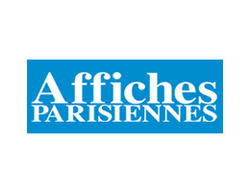
Référence complète : Moreaux, A., Comment se conformer au RGPD ?, in Affiches Parisiennes, mai 2018, pp. 1-3.
L'échéance du fameux Règlement général sur la protection des données approche. Pour Mounir Mahjoubi, secrétaire d'État au Numérique, « 2018 est l'année du RGPD » qui va entraîner un « véritable choc de sécurité » sur la toile. La mise en conformité avec le nouveau règlement européen sur le digital qui entre en vigueur le 25 mai est une question centrale pour les entreprises.
April 16, 2018
Blog

It is about a particular case that one can rephrase the general questions. If the case is hot, it is even more important to return to the general questions, which are always colder (more boring, too).
Thus, Cambridge Analytica is a case of which everyone speaks a lot ... It is at the same time particular and very burning.
So we talk about it a lot, and with vehemence, and in a way often definitive, as well in attack as in defense.
For the prosecution, there are many advocacies, gathered for example in the Guardian's files.
For the defense, we find less. But one can read for example the article that has been published in early April 2018: Why (almost) everything reported about the Cambridge Analytica Facebook 'hacking' controversy is wrong.
The number of comments, and their more or less inflamed nature, in any case always definitive, does not mean anything in itself.
The regulators took the floor a little later, both in a more concrete way, the "group of 29" (bringing together all the European Regulators personal data) establishing the 11 April 2018 a working group on this subject and publishing April 10, 2018 new guidelines on the place that must be made to "consent".
But for the moment, if we loof at the media, it looks like a trial, because everyone claims to be entirely right and pretends that the other is entirely wrong. Trial to break the truth and virtue, say the accusers. Trial in witchcraft, says Facebook. And it's always up to us.
Because all this is probably due to the fact that we are no longer spectators: we are placed in the judge's position. The financial market was the first judge. It has already condemned. Without really trying to find out. This is because the public good of the financial markets is Trust, it is enough that one can even suspect the wife of Caesar, and so it is not really matter of truth of the facts and goof application of Rule of Law.
For the public opinion that we are, this is something else, because we could wait to know more. And we should, since we seek to remain a little attached to the "truth " of the facts and respect for the Rule of Law. However, this case is complex and is above all a matter of judicial analysis which will come and which we cannot lead ourselves, both in terms of the facts-which are complex-as well as the rules of law to be applied which are equally so.
What turns us into a court, an ordinary sociological phenomenon, is a new legal mechanism: the "whistleblower". By nature, it gives the bonus to the Attack
This logic of the legal mechanism of the whistleblower, a movement of fact to throw facts as one throws a buoy outside but one could also say stones on the firm that the insider denounces, logic today encouraged and protected by the Law, allows a person who knows something, most often because he participated, to let everyone know, without a filter. To denounce it. For the public good..
The successive texts on the whistleblower are nrms of a Compliance Law
The case is exemplary of this, since Facebook is "denounced" only in second place, behind Cambridge Analytica, but the notoriety and power of the first makes that it is hit first. French law in the so-called "Sapin 2 Act " of 2016 has ensured to protect the company denounced, but British and American Law are more violent, probably because they encourage more the private enforcement.
Temporality is therefore favorable to the attack. The time of the defense is always slower. It is usually the people in situations of weakness who suffer it: slowness of justice, justice outside courthouses, etc. With Compliance mechanisms, it is probably the very powerful who will live this. It is not a matter of rejoicing: the misfortune of some (here the difficulty of a company hasty "judged") does not console in any way the misfortune of others (the difficulty of ordinary beings accused or having only the right to protect themselves to reach concretely a judge and really get a judgment executed, even as they are in their right).
But if we go to general questions, since on the facts of this case we don't have the means to appreciate them, nor on the rules which apply to them, we cannot apply them in an adequate way until a court will have exercised its office?
However, the general perspectives highlighted by this singular case are two orders: Probationary order (I) and Accountability order (II).
Read below.
Frison-Roche, M.-A., Compliance Law, 2016.
On this notion, Frison-Roche, M.-A., From Regulation Law to Compliance Law, 2017.
April 4, 2018
Thesaurus : Doctrine
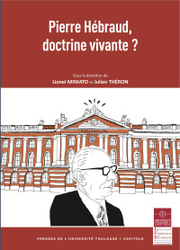
► Référence complète : E. Jeuland, "Hébraud, la notion de droit processuel dans la perspective de justice numérique, in L. Miniato et J. Théron (dir.), Pierre Hébraud, doctrine vivante ?, Presses Universitaires de Toulouse - LGDJ, 2018, pp. 25-37.
____
►lire la présentation du livre dans lequel cet article est publié : 📗Pierre Hébraud, doctrine vivante ?
____
____
Feb. 26, 2018
Blog

Cryptocurrencies seem to be admitted, delivered from the State. And many rejoiced.
Let's take the question on the side of Law.
In France, we remember an article written in 1968 by the great lawyer Carbonnier : L'imagerie des monnaies (Imagery of Coins), seeing in Caesar's face engraved on the coin the image of the State itself, guarantor of the entire monetary and exchange system.
In Europe, we remember the discussions on the image of the euro, how each state in the zone could express its existence while the guarantee was common and concentrated in the same central bank, preferring a public building to a character.
Today the currencies to be virtual do not have less an "image".
One could even say that they have only that, since it is no longer the State which, by the face of Caesar is inserted there.
But other faces can be imbued. Could the law find fault with it, because some figures would be "reprochable" because only Caesar would be beyond reproach? Could the Law draw any consequences from it, because some figures would be "engaging", less than that of Caesar but still a little?
Certainly, not faces that the Criminal Law rejects, not that of Jack the Ripper, not that of Hitler. But other historical figures less clearly banned, in this period where it is easily argued that everything would be "questionable" and therefore admissible and that besides everything would be "to discuss", the currency thus expressing this flow of discussion , speech that goes from hand to hand, from post to post on virtual networks?
Still, figures are block around them. This is particularly true in communities that can thus elect them to trust each other: just like their "Caesar", and knowing each other well, lend themselves more easily with confidence, to pay each other, while they would not lend to others, they would not buy from others.
Why no. Since we accept the principle of this currency, based on the only technical security (double encryption) and trust between people (intersubjectivity of a circle that has been chosen), without mentioning the issue of the debtor as a last resort, in order to challenge Caesar and public finances.
But let us take the hypothesis that the figure embedded in the virtual currency is that of Jesus. And the hypothesis is not fancy.
Indeed, the "religious currencies" are multiplying.
And the platforms that offer them insist on the fact that these tokens that are exchanged between people who believe in Jesus place great trust in the "son of God" and are therefore particularly trusting each other, for example in their respective capacity to keep their commitment. Outside the Law. On their respective ability to help each other. Outside the Law.
Is it necessary to forget the affirmation that it was necessary "to render to Caesar what was Caesar's"?
Let's ask some questions in Law.
- Reflections on what could or should be the "regulation" of non-state currencies, whether we call them virtual or not (in what does this change the nature of the currency?), That we secure them by encryption technology and / or by the decentralization of information, should they also relate to images?
- Are non-state currencies so much that the religious image, as long as it is not contrary to public order, is permissible, notably in legal systems where the constitutional principle of secularism has as its object and effect not only to neutralize the religious significance of religious objects but also to protect religious freedom?
- Can "religious currencies" be protected and have specific economic and financial significance, as the United States Supreme Court admitted in the Hobby Lobby judgment of June 30, 2014? Europe is not the United States.
- If the image of Jesus is encrusted on the currency, can we consider that the corpus is also inserted so that the platform that attracts a particularly interesting clientele (solvent, "responsible", holding its commitments, etc.) ? This insertion of the religious corpus, as the state was through the face of Caesar would operate not de jure but de facto, so that the company holding the platform should respond to third parties by the factual belief that this may have generated in third parties.
- Moreover, do not these "religious currencies" produce a specific systemic risk? Not that such and such a religion could collapse, or this or that religious effigy to undergo a haircut with a domino effect on all the saints, waves of doubt provoking a mistrust of all the faithful ones because the various religions are doing well, but precisely because the mark of these religious communities to which these platforms specifically appeal is to make "their own law" prevailing over the law of the Dtate, considered inferior since it comes only from men and not from God.
And now the churches are starting to coin money...
At the very least, it will be necessary in Ex Post that the faithful do not come to seek the state by guaranteeing if there is bankruptcy, because Caesar does not meddle in the affairs of Jesus. To each his currency and each to reread Carbonnier, one of the finest readers of the Bible
______
Feb. 22, 2018
Thesaurus : Doctrine
Référence complète : Malaurie-Vignal, M., Concurrence - Efficacité économique v/ politique de concurrence ? Réflexions à partir du marché du numérique, Contrats Concurrence Consommation n° 2, février 2018, repère 2.
L'article peut être lu par les étudiants de Sciences po via le Drive dans le dossier "MAFR - Régulation & Compliance"
Feb. 6, 2018
Thesaurus : 09. Juridictions étrangères
Jan. 10, 2018
Thesaurus : Doctrine
► Référence complète : La datacratie, numéro spécial Revue Pouvoirs, 2018, PUF, 216 p.
____
Lire l'ensemble des contributions
____
► Sommaire :
Antonin GUYADER, "Les enjeux du grand bouleversement
Benoît THIEULIN, "Gouverner à l'heure de la révolution des pouvoirs", "Mouv
Fabien GRANJON, "Mouvements sociaux, espaces publics et usages d'Internet"
Jean-Marc MANACH, "Défavorablement connus"
Dominique CARDON, "Le pouvoir des algorithmes"
Henri ISAAC, "La donnée numérique, bien public ou instrument de profit"
Alexandre EYRIÈS, "La twitt-politique : l'élection présidentielle française de 2017 sur les réseaux socionumériques"
Jayson HARSIN, "Un guide critique des fake news : de la comédie à la tragédie"
Alexis BRÉZET, Benjamin FERRAN : "Récit-fiction : le jour où les plateformes américaines ont tué les médias européens"
Benjamin BAYART, Agnès de CORNULIER, "La neutralité du Net"
Jean DEYDIER, "Les exclus de la datacratie"
Jeremy CORBYN, "Manifeste de Jeremy Corbyn pour la démocratie numérique"
________
Nov. 27, 2017
Thesaurus : Doctrine
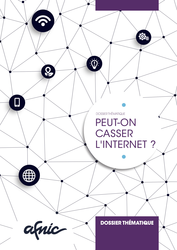
► Référence complète : Association française pour le nommage Internet en coopération (Afnic), Peut-on casser l'internet ?, dossier thématique, 2017, 8 p.
____
________
Nov. 24, 2017
Thesaurus : Doctrine
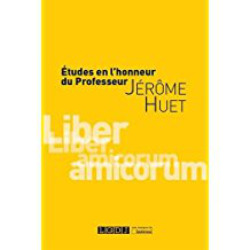
Référence complète : Warusfel, B., La transversalité du droit du numérique, in Études en l'honneur du Professeur Jérôme Huet. Liber amicorum, LGDJ - Lextenso, 2017, pp. 411-423.
Consulter une présentation générale de l'ouvrage.
Les étudiants de Sciences po peuvent lire l'article via le Drive dans le dossier "MAFR - Régulation".
Nov. 24, 2017
Thesaurus : Doctrine

Référence générale : Études en l'honneur du Professeur Jérôme Huet. Liber amicorum, LGDJ - Lextenso, 2017, 423 p.
Lire la table des contributions.
Consulter la présentation des contributions suivantes :
Nov. 24, 2017
Thesaurus : Doctrine

Référence complète : Vogel, L., Réseaux contre plates-formes : la distribution sélective à l'épreuve de l'internet, in Études en l'honneur du Professeur Jérôme Huet. Liber amicorum, LGDJ - Lextenso, 2017, pp. 401-410.
Consulter une présentation générale de l'ouvrage.
Les étudiants de Sciences po peuvent lire l'article via le Drive dans le dossier "MAFR - Régulation".
Nov. 24, 2017
Thesaurus : Doctrine

Référence complète : Derieux, E., Données à caractère personnel et communication publique . Règlement (UE) 2016/79 du 27 avril 2016 relatif à la protection des personnes physiques à l'égard du traitement des données à caractère personnel et à la libre circulation de ces données in Études en l'honneur du Professeur Jérôme Huet. Liber amicorum, LGDJ - Lextenso, 2017, pp. 127-138.
Consulter une présentation générale de l'ouvrage.
Les étudiants de Sciences po peuvent lire l'article via le Drive dans le dossier "MAFR - Régulation & Compliance".
Nov. 24, 2017
Thesaurus : Doctrine

Référence complète : Seidowsky, O., Audits logiciels et conformité digitale, in Études en l'honneur du Professeur Jérôme Huet. Liber amicorum, LGDJ - Lextenso, 2017, pp. 329-338.
Consulter une présentation générale de l'ouvrage.
Les étudiants de Sciences po peuvent lire l'article via le Drive dans le dossier "MAFR - Régulation".
Nov. 19, 2016
Interviews
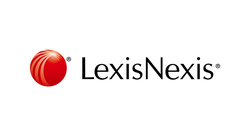
Référence complète : Frison-Roche, M.-A., Pour réguler l'espace numérique : la solution de "l'interrégulation" !, entretien, Revue Communication Commerce Électronique, nov. 2016, p.8.
Cet interview a été donné à l'occasion de l'ouvrage Internet, espace d'interrégulation
Il aborde trois questions :
- la définition de l'interrégulation,
- les justifications de l'interrégulation en matière numérique
- les conditions de l'effectivité de l'interrégulation en matière numérique
Sept. 14, 2016
Thesaurus : Soft Law
April 22, 2016
Editorial responsibilities : Direction of the collection "Regulations & Compliance", JoRC & Dalloz
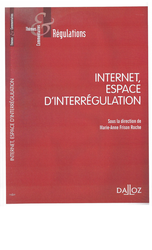
Complete references : Frison-Roche, M.-A. (dir.), Internet, espace d'interrégulation, Serie "Régulations", coll. "Thèmes & Commentaires", Dalloz, Paris, 2016.
Read the presentation of the book (written in French).
Read the presentation of the authors of the contributions (written in French)
"Regulate the Internet".
Some argue that any regulation is contrary to the nature of digital. Others argue that this is indispensable, for its economic deployment and for public freedoms. Internet renews conceptions and practices. Notably those of the Law of the Regulation. Indeed, the Internet makes it possible to offer and obtain services that are in often regulated sectors: financial, audiovisual, healthcare, gaming. Moreover, they converge in new objects: the connected objects.
Often described as a "legal desert", digital appears as a kind of jumble of systems of various regulations that overlap, deform and contradict each other. In reaction, an "interregulation", de facto or de jure, in law more or less flexible, is in the process of being established. Who will be the Regulator: The States? The judge? The Internet users?
The future is open.
The book first determines the "Interregulation Needs" and then describes and conceives solutions for the interregulation of the digital space.
Read the presentation of the two articles written by Marie-Anne Frison-Roche:
Thinking the world from the notion of "data"
To draw the regulatory consequences of a rethinked world from the notion of "data"
The working papers which are the base of these articles are written in English.
April 22, 2016
Publications
📝Rethinking the world from the notion of "data" (Penser le monde à partir de la notion de "données")

Référence complète : Frison-Roche, M.-A., Penser le monde à partir de la notion de "donnée", in Frison-Roche, M.-A. (dir.), Internet, espace d'interrégulation, série "Régulation", 2016, p.7-16.
English summary :
Law is a reconstruction of the world through definitions and categories, expressed in words, to which are imputed rules. There is always a share of invention in Law, articulated to a share of fidelity to the concrete world that it retranscribes, a combination enabling Law to regulate the latter.
Law is put in difficulty by what the term "data", quite new, is not easy to define. The fact that it is strangely formulated in Latin to show that there is plurality, the data, before associating it with an English adjective when there are many, the "big data", does not advance us more on what a "data" is. Law is a practical art that works well only if it manipulates categories whose definition is mastered.
This is why, in a first stage, we must recognize the uncertainties of the very notions of "data" (I), in order to orientate the adequate rules in the second step towards what is a given, namely a "pure" value in our consumer information society (II).
This article is linked to another article published in the same book : Les conséquences régulatoires d'un monde repensé à partir de la notion de "donnée" ("the regulatory consequences of a word redesigned from the notion of "data")
April 22, 2016
Publications

Référence complète : Frison-Roche, M.-A., Les conséquences régulatoires d'un monde repensé à partir de la notion de "donnée", in Frison-Roche, M.-A. (dir.), Internet, espace d'interrégulation, série "Régulation", Journal of Regulation - Dalloz, 2016, p.183-207.
Il est à corréler à un article publié dans le même ouvrage : Penser le monde à partir de la notion de "donnée".
Cet article s'appuie sur un working paper : lire le working paper.

Updated: March 12, 2016 (Initial publication: Nov. 7, 2015)
Publications

Law is a reconstruction of the world through definitions and categories, expressed in words, to which are imputed rules. There is always a share of invention in Law, articulated to a share of fidelity to the concrete world that it retranscribes, a combination enabling Law to regulate the latter.
Law is put in difficulty by what the term "data", quite new, is not easy to define. The fact that it is strangely formulated in Latin to show that there is plurality, the data, before associating it with an English adjective when there are many, the "big data", does not advance us more on what a "data" is. Law is a practical art that works well only if it manipulates categories whose definition is mastered.
This is why, in a first stage, we must recognize the uncertainties of the very notions of "data" (I), in order to orientate the adequate rules in the second step towards what is a given, namely a "pure" value in our consumer information society (II).
Read the article written in French on the basis à this working paper
Feb. 12, 2016
Thesaurus : 08. Juridictions du fond
Lire l'arrêt de la Cour d'appel de Paris.
Lorsqu'un Internaute a recours aux services de FaceBook, il accepte les "conditions générales" dans lesquelles sont insérées des stipulations diverses, par lesquelles une clause attributive de compétence territoriale aux juridictions de Santa Clara (Californie).
Certes, cette clause est nulle en droit de la consommation, mais FaceBook, assigné par un internaute devant un Tribunal de Paris, affirme que le droit de la consommation n'est pas applicable car il ne s'agit pas d'un "contrat de consommation" puisqu'il s'agit du rapport de gratuité.
La Cour d'appel de Paris ne retient pas cette argumentation tirée de la "gratuité" et constate au contraire que FaceBook en retire des bénéfices très importants et qu'il s'agit d'un contrat d'adhésion régi par le droit des clauses abusives et du Règlement communautaire de protection des consommateurs.
La Cour d'appel relève que le Règlement communautaire confère au consommateur le droit de saisir le juge de son domicile, que le Code de la consommation protège le consommateur contre la privation de fait de son droit d'action, ce à quoi équivaut l'obligation de saisir pour un internaute français une juridiction californienne, "entrave sérieuse à son droit d'action en justice" et "déséquilibre significatif entre les droits et obligations des parties".
C'est pourquoi la Cour d'appel de Paris confirme l'Ordonnance par laquelle le Président du Tribunal de Grande instance de Paris a déclaré non-écrite la clause attributive de compétence et déclaré compétent le Tribunal de grande instance de Paris sais par l'internaute contre FaceBook.